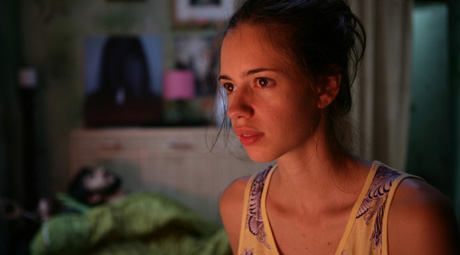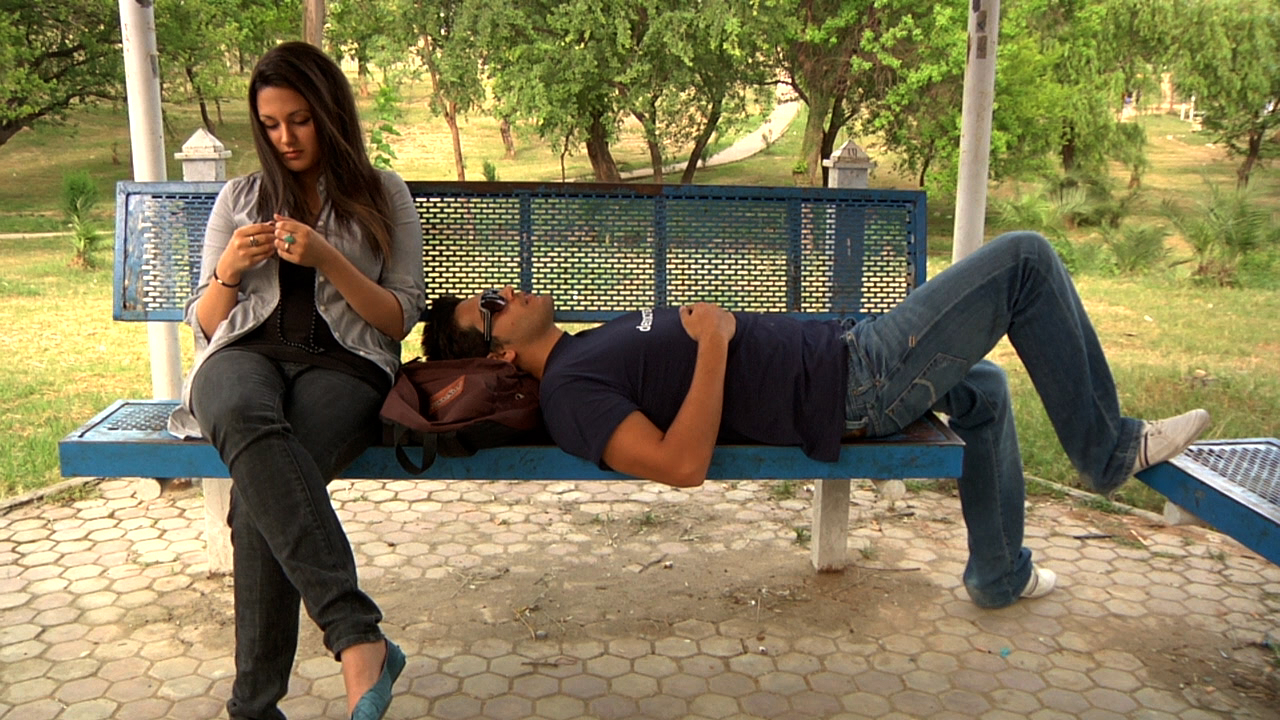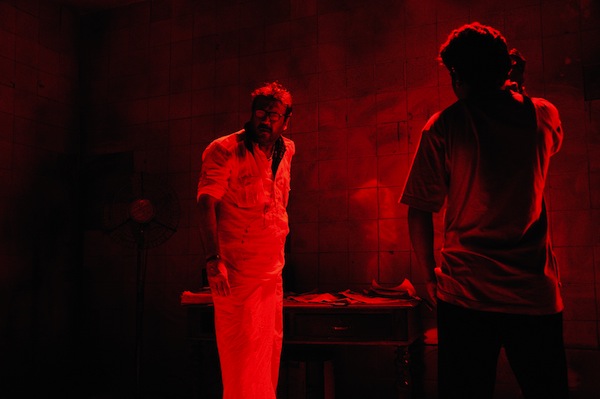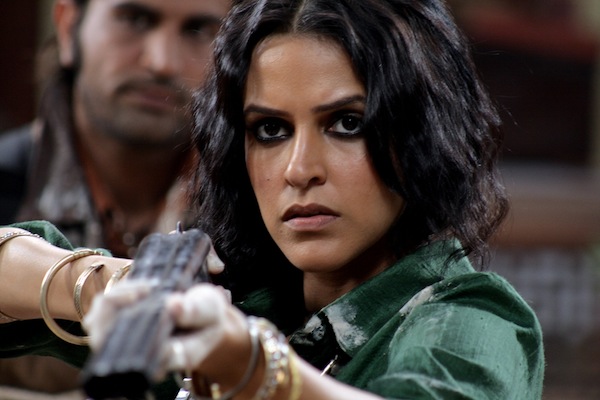ScreenAnarchy at SAIFF 2010: A Preview

"South Asia" takes in a
lot of territory, both literally and culturally/aesthetically, so you've
got to hand it to the fest and programmer Galen Rosenthal in particular:
the diversity of themes, styles, and genres on display in this year's
SAIFF is downright stunning. The easier path would have been to pick
a brow--low, middle, or high--and stick with it, thus playing it safe
by appealing to a certain target audience and stacking the deck accordingly.
Instead, this year's SAIFF goes after movie-lovers in all shapes and
sizes. There are wide-ranging approaches to filmmaking on display, from
the boldly experimental to crowd-pleasing popcorn fare, and with both
veterans and up-and-comers well-represented. Yet because of that same
diversity, fest-goers may welcome some guidance, so with that in mind
I offer up the following preview of what's on tap.
Harud ("Autumn")
Managing somehow to be both
meditative and seething, Harud represents quite an accomplishment
for veteran actor-turned director Aamir Bashir. It's the rare first
feature that betrays no missteps and no misgauging of its target--neither
cautiously picking an overly modest topic nor trying to make a big splash
by working on a grand scale. Instead, Bashir and co-writer Mahmood Farooqui
take the classic approach of trying to capture the plight of a people
and a moment in history not through sweeping gestures and a cast of
thousands, but by selecting the right protagonist, keeping the focus
tight, and drilling deep. Since I knew very little of life in contemporary
Kashmir and the quiet brutality of Indian security forces stationed
there, I suppose Harud has done its job as a "raising awareness"
flick; my hesitancy in admitting this is due only to the fact that it's
far too artful and personal to be deserving of that epithet.
Bashir's quasi-Bressonian approach--using non-actors whose faces speak volumes and often focusing on the smallest, most mundane physical actions--achieves wonders here. As melancholy as the title suggests, Harud unspools scene after scene of quiet despair. And "quiet" is meant literally: eschewing an ever present musical score to convey emotions, Bashir relies on the script, the actors (lead Shahnawaz Bhat is nothing short of heartbreaking) and his own instincts. Beautifully shot, with a rich, vivid color palette, and fluid, naturalistic camerawork, Harud is very easy on the eyes. To be sure, the pacing is measured and deliberate, but the tempo never feels sluggish because of the underlying intensity. So no, the film is not a variety of thriller despite the simmering tension that runs throughout. As one might expect from a film about those who have "disappeared" and those they've left behind, the tone is more like that of a ghost story: the living are haunted by the missing, and we're haunted by the living. Well received at Toronto and elsewhere, Harud is clearly one of SAIFF's must-see's.
That Girl in Yellow Boots
It's easy to see why this
film from Anurag Kashyap, an impressive director going back to the terrorist
docudrama Black Friday (2004), is the festival's opening night
selection. Engaging, and both pulpy and sensitive, it could end up being
the most popular film in the lineup. One reason is the undeniably star-making
turn by lead Kalki Koechlin. Uncharitably described by one character
as a mixture of Bugs Bunny and Julia Roberts, she's actually a lot
more than that--a real screen presence but also a good enough actor
so that she doesn't overwhelm the material with that presence.
Still, That Girl in Yellow
Boots was a very hard film for me to get a handle on overall, at
least initially. Its aspirations didn't really make sense to me, and
summaries I'd read that referred to it as some kind of crime thriller
turned out to be misleading. It's more of a straight-ahead drama in
the fish-out-of-water vein... with some sex and drugs thrown in. Yes,
at the core is a compelling mystery or quest picture--a young woman
in search of the father she never knew. But the plot features so many
tangential offshoots that its approach might be described as kaleidoscopic.
There's an addiction-and-recovery subplot. There's an owing-money-to-gangsters
subplot. And there's a keeping-the-government-from-
However, a few days after watching That Girl in Yellow Boots, I realized that there was a major, unifying theme that I'd simply missed: the film is largely an examination of all the different flavors of male-female relationships--the co-dependent, the abusive, the maternal/paternal, the matter-of-factly sexual, and so on. My final thought, then? I need to watch this again.
The Image Threads
Here's a film that makes
me excited about my own ignorance. What I mean is that I'm unfamiliar
with director Vipin Vijay's previous work, but my shame at this is
outweighed by my excitement at eventually discovering it. I'd come
across a brief bio stating that he's not a populist filmmaker, and
if The Image Threads is any indication, that's the understatement
of the year. Brainy, audacious, and challenging, this film is not for
everyone, but I suspect that those who like it will often love it. You
can keep your Enter the Void--this is visionary filmmaking circa
2010.
The Image Threads is screening in the dramatic competition category at SAIFF, where its oblique, self-deconstructing narrative (involving an online discourse/relationship that is both sexual and transcendent of sex) probably works against it: it's not "gripping" in the conventional sense and certainly isn't as accessible as its competition. The excitement here is pretty much entirely of the intellectual and aesthetic variety--although that description makes Vijay's achievement seem far drier and crustier than it really is. In visual terms, The Image Threads is well beyond the typical descriptors of "interesting" or "striking": nearly every shot in the film is pleasing to both mind and eye, and the cumulative effect of all this creativity has a good chance of bowling over even the most jaded cineaste. In essence, it renews one's faith in feature-length experimentation itself. How to sum up the experience? Think about the cinematic mysticism of a Jodorowsky filtered through the hyper-precise and cutting-edge sensibility of an author like William Gibson or Don DeLillo. Yes, that means that much (or even most) of this film went over my head--which is why I'm anxious to check it out again the first chance I get.
Slackistan
With its strong opening scene
and a protagonist who laments the fact that he can't rent a DVD of
Mean Streets in Islamabad, it's hard not to root for Hammid Khan's
ambitious feature. Add a likable, attractive cast, and an intriguing
Mean Streets-inspired subplot about an outstanding debt to some
shady characters, and all the ingredients are in place for a winning
entertainment, not to mention a revealing, the-paint-is-still-wet portrait
of twenty-somethings in urban Pakistan. Certainly Khan does a more than
respectable job of introducing Islamabad to those (like me) who are
unfamiliar with it, imbuing the city with a personality all its own.
But beyond these moderate pleasures, the film was something of a disappointment
for me, gradually devolving into something that's decidedly less than
the sum of its parts
Of course with a title like Slackistan, one expects a certain amount of navel-, if not shoe-, gazing, but here the end result feels like a shoe gazing at its navel. Suffering from a flatness of pacing, uneven one-liners and production values, and a voice-over that occasionally slips into near-monotone, Slackistan shows why sensitive, indie-style serio-comedies are deceptively hard to pull off. What's most dismaying is that a film that intelligently touches on themes of American political and cultural hegemony itself succumbs to the tidiest of Hollywood conclusions, offering up bits of truth that are meant to be refreshingly self-evident but come across as obvious, if not predictable. At first star Shahbaz Shigri's physical resemblance to Joshua Jackson seemed mere coincidence, but when combined with the script's adolescent themes (how do I handle that the love of my life is with a more successful guy?) and adolescent sense of wisdom ("It's sad when passion goes to waste"), it made me feel like I was watching a South Asian adaptation of Dawson's Creek. To be more charitable, the use of pop music and quick montage to establish place and move things along sometimes created the illusion of viewing an extended episode of The Real World: Islamabad.
The Untitled Kartik Krishnan Project
Like Slackistan, this
is also about a young filmmaker; unlike it, it is also about filmmaking,
not just the concept of filmmaking. For long stretches, Srinivas Sunderrajan's
meta-comedy is just so dead-on and so hilariously deadpan that you can't
help but sit there with a smile on your face. To choose but one example,
the scene where our film geek protagonist wants to know what it's
like to meet Tarantino is simply priceless. Indeed, such scenes alone
make the movie more than worthwhile, especially for film buffs. But
that's not the full extent of its accomplishments. Just as its forward
momentum starts to lag and its narrative begins to meander, the film
morphs into something rich and strange.
First The Untitled Kartik
Krishnan Project enters creepy, Kafkaesque waters as a government
official suddenly intrudes on the filmmaking process that's depicted
in the narrative. Then the film we're watching folds itself inside-out,
transfiguring itself into a rather haunting--not cerebral--exercise
in meta-dom. It's a risky shift in gears by Sunderrajan and company,
but they pull it off. Don't expect your date to deal with this transition
too smoothly, but now that you've been prepared, sit back and enjoy.
This is low-budget filmmaking at its best, fueled by conviction and
inventiveness at every turn. Like The Image Threads but on a
more modest scale, it's a film that makes one believe in the magic
of cinema itself.
Anima and Persona
It's a cliché that Indian
films can be all over the place in terms of tone and generic content,
but Anima and Persona (I don't quite get the Jungian title)
certainly does a deft job of interweaving romance, father-son drama,
and gangster epic: you never feel like the film is a kitchen-sink jumble
despite its eclecticism. Though undeniably goofy at times and sporting
a couple of all-out chase scenes, Anima and Persona isn't really
an action-comedy but more like a black comedy.
Still, despite its strategy of supplying entertainment value on multiple fronts, I suspect audiences will be divided on this one. The internal gang dissension and how it plays into a conflict with a rival gang is initially reminiscent of Johnny To at his best, and there are several memorable scenes along these lines (including a very effective one involving the use of speaker-phone). But director Kumararaja doesn't seem interested in sustaining that level of stylish intelligence. Instead, he shoots for a more standard noir with some additional action scenes included for good measure. The problem, I think many audiences will feel that the film doesn't quite surrender to its own popcorn-oriented instincts, which will make it come across as neither here nor there. To be fair, though, the version that I screened was a rough cut, so it's entirely possible that additional polish could throw the crowd-pleasing elements of the film into greater relief.
Gandu
A coming-of-age wish-fulfillment
fantasy that's nothing less than a welcome antidote to the forced
Dickensian melodrama of Slumdog Millionaire. Where Danny Boyle's
film was glossy to the hilt, here the black-and-white cinematography
and the keeping-it-real direction by Q (yes, that's a full name) make
Gandu feel both more raw and more honest. That's true even during
the musical interludes, which feature rap songs performed by the protagonist,
an uncharming ne'er-do-well (the title translates to "A**hole").
Instead of coming across as obligatory production numbers, they feel
like moments of mindscreen that help us get to essence of the character.
Indeed, in its portrait of youth today Gandu recalls a film as embarrassingly
truthful as Royston Tan's 15 (2003), that is,
until the wish-fulfillment aspect of the final reel.
Some may delight in the sudden turn of events, but for me, the lack of irony in Gandu means that a situation that's grounded in interesting specifics is forced to become a more generic fable. Such an approach might work, if the first part had set up the character and his situation as more archetypal, but it didn't; it was too closely-observed, too believable, so that the subsequent shift was too jarring for me. Or maybe the film is ironic and I just missed it? You tell me. Oh, and a couple of final points: the Oedipal themes are a bit clumsy; on the other hand, the graphic sex scenes--and I need to underscore graphic, in case you're thinking of seeing this movie with your Mom--are actually quite well done.
With Love to Obama
With an inspired premise and
often hilarious (especially in the early-going), With Love to Obama
is sure to make plenty of filmgoers happy. Without trying too hard,
this crime farce comes across as a wry, irony-heavy commentary on both
the interconnectedness of the global economy and what the optimism of
Obama's 2008 victory means in the face of so many compelling reasons
to remain cynical. The opening, with fluid camerawork and disarming
dialogue, is both entrancing and humorous, recalling alternatively both
early Tarantino and the best of HK or Chinese goofball caper movies
(cf. Crazy Racer). The idea of kidnapping an NRI mistakenly believed
to be wealthy, and his subsequent use of his business skills to outwit
increasingly high-powered gang bosses--well, it works in theory. To
be sure, it often works in practice, too, but unfortunately not enough.
When With Love to Obama
succeeds it does so because it's the kind of underdog film in which
we root both for the scrappy kidnappers and their beleaguered capitalist;
but when it loses its way it's because the script kind of forgets
that we also need someone to root against. The way the main villain
keeps changing is certainly clever, but dramatically the story becomes
less and less gripping--as if so pleased with its structure that it
forgets about its heart. And it's that sense of self-satisfaction,
of not going the extra yard for the audience, that keeps With Love
to Obama from being a contemporary classic, a South Asian updating
of an Ealing comedy. At a running time of two hours, it instead feels
like a 90 minute movie that was allowed to sit too long at the dinner
table--in scene after scene, one can spot the extra minute or two that
could have been trimmed. And it's that padding that, in part, helps
the film dull its own sharp edges. The dynamic between the two leads
is effective but the plot's pretext for keeping them both captives
wears thin. Worse still, there's never a tangible sense of jeopardy--the
bad guys talk a tough game, but the film lacks a memorable sequence
of violence or pursuit that would both underscore the stakes and act
as relief valve to endless scenes of people talking in rooms. Sadly,
the pacing and tension gradually peter out just when they should feel
most heightened.
As wind-up, I should note that
I really envy those who'll be able to catch many of these on the big
screen. And of course check back with Team ScreenAnarchy over the next few
days as my esteemed colleagues provide more in-depth reviews of these
titles.





















